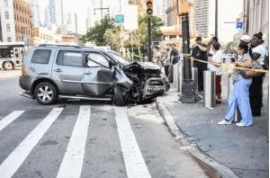If you have been involved in a car accident you may not know what to do to protect yourself. The decisions you make and actions you take could impact your rights to recover fair compensation.
Every day, thousands of people get into accidents in New York. Do you know what to do after an accident and what your legal responsibilities are? What about afterward when you’re filing a claim? Here’s what you need to know.
Before the Car Accident
Quick, could you tell someone about the policy limits on your car insurance? New York is a no-fault accident state, which means you file claims with your own insurance first before you try a lawsuit. The surest way to get enough compensation is to carry enough insurance.
The minimum auto insurance requirements are usually far too low for any serious accident. We recommend carrying at least $100,000 in PIP coverage if you can afford it. On average, most people will be in at least 3-4 car accidents in their lifetime. They won’t all be major or your fault, but that’s what the insurance statistics tell us.
Therefore, it’s in your best interest to prepare for this by having enough coverage. If you do this, you may not need to go to court at all to get the compensation you deserve. Check your policy every year to see if you have enough coverage.
For a free legal consultation, call (212) 732-2929
At the Scene of the Accident
In New York, people in an accident have legal responsibilities. Failing to do certain things could lead to criminal charges and could also put your compensation at risk. Here’s what you must do at the scene of the accident:
- Get everyone to safety, if possible. Move any cars to a safe location, like the side of the road. Turn on hazard lights and, if necessary, use road flares and reflective devices so other cars can spot the accident.
- Call 911 to report the accident and any injuries. Follow the instructions of the 911 operator. When the police arrive, give them the facts of what happened so they can fill out their report. Stay at the scene until you’re released.
- While you are waiting, exchange your full name, insurance information, contact information, license plate numbers, and driver’s license numbers with all the drivers.
- If you are taken to the hospital because of injuries, it’s likely the police will contact you to give a report. They may have the contact information for the other drivers so you can prepare your claim.
If you can do so, take photos of the accident scene, your injuries, and the state of the cars. Locate any witnesses and get their contact information so your lawyer can ask for a statement. Do not make any claims about who is responsible for the accident.
After the Accident
If you did not go to get checked out by a doctor after the accident, do that next even if you feel okay. You may have injuries hidden by adrenaline and shock that could get worse later if you don’t get early treatment. These hidden injuries might take weeks to show themselves.
The next step is to contact a personal injury attorney in your area for advice. They can help you craft a strong claim when you contact your insurance company. They can also advise you on whether to sue the other party at fault.
Your lawyer may also have advice on how to maximize the value of your claim. For instance, you could keep a pain journal documenting how your injuries have affected your life. This is a useful tool for calculating pain and suffering claims.
Click to contact our personal injury lawyers today
Deciding to Go to Court
Eventually, your insurance and your lawyer will negotiate an offer to settle your New York car accident. Your lawyer will give you advice on whether it’s a fair offer and whether you should go to court against the other driver.
New York uses a pure comparative fault system. As long as you are less than 100% responsible for the accident, you can pursue compensation in court. Your percentage of fault will reduce the value of your claim by that amount.
Going to court will delay getting your final settlement check, but it could make your case far more valuable. Your lawyer will explain the pros and cons, but leave the decision to you. Whichever you choose, the matter ends once you receive a settlement or the final award from court.
Protect your rights—schedule a consultation with our personal injury attorneys. We’ve successfully represented clients in a variety of personal injury cases, from car and construction accidents to serious injuries and wrongful death.
Call or text (212) 732-2929 or complete a Free Case Evaluation form






